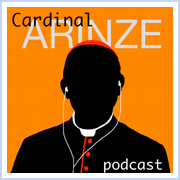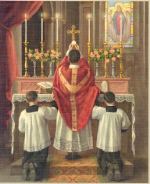Gospel for Friday, 21st Week in Ordinary Time
From: Matthew 25:1-13
The Parable of the Wise and Foolish Maidens
(Jesus said to His disciples,) [1] "Then the Kingdom of Heaven shall be compared to ten maidens who took their lamps and went to meet the bridegroom. [2] Five of them were foolish, and five were wise. [3] For when the foolish took their lamps, they took no oil with them; [4] but the wise took flasks of oil with their lamps. [5] As the bridegroom was delayed, they all slumbered and slept. [6] But at midnight there was a cry, `Behold the bridegroom! Come out to meet him.' [7] Then all those maidens rose and trimmed their lamps. [8] And the foolish said to the wise, `Give us some of your oil, for our lamps are going out.' [9] But the wise replied, `Perhaps there will not be enough for us and for you; go rather to the dealers and buy for yourselves.' [10] And while they went to buy, the bridegroom came, and those who were ready went in with him to the marriage feast; and the door was shut. [11] Afterwards the other maidens came also, saying, `Lord, lord, open to us.' [12] But he replied, `Truly, I say to you, I do not know you.' [13] Watch therefore, for you know neither the day nor the hour."
******************
Commentary:
1-46. The whole of chapter 25 is a practical application of the teaching contained in chapter 24. With these parables of the wise and foolish virgins and of the talents, and His teaching on the Last Judgment, our Lord is again emphasizing the need for vigilance (cf. note on Matthew 24:42). In this sense, chapter 25 makes chapter 24 more intelligible.
1-13. The main lesson of this parable has to do with the need to be on the alert: in practice, this means having the light of faith, which is kept alive with the oil of charity. Jewish weddings were held in the house of the bride's father. The virgins are young unmarried girls, bridesmaids who are in the bride's house waiting for the bridegroom to arrive. The parable centers on the attitude one should adopt up to the time when the bridegroom comes. In other words, it is not enough to know that one is "inside" the Kingdom, the Church: one has to be on the watch and be preparing for Christ's coming by doing good works.
This vigilance should be continuous and unflagging, because the devil is forever after us, prowling around "like a roaring lion, seeking someone to devour" (1 Peter 5:8). "Watch with the heart, watch with faith, watch with love, watch with charity, watch with good works [...]; make ready the lamps, make sure they do not go out [...], renew them with the inner oil of an upright conscience; then shall the Bridegroom enfold you in the embrace of His love and bring you into His banquet room, where your lamp can never be extinguished" (St. Augustine, "Sermon", 93).
**********************
Source: "The Navarre Bible: Text and Commentaries". Biblical text taken from the Revised Standard Version and New Vulgate. Commentaries made by members of the Faculty of Theology of the University of Navarre, Spain. Published by Four Courts Press, Kill Lane, Blackrock, Co. Dublin, Ireland.
Reprinted with permission from Four Courts Press and Scepter Publishers, the U.S. publisher.









